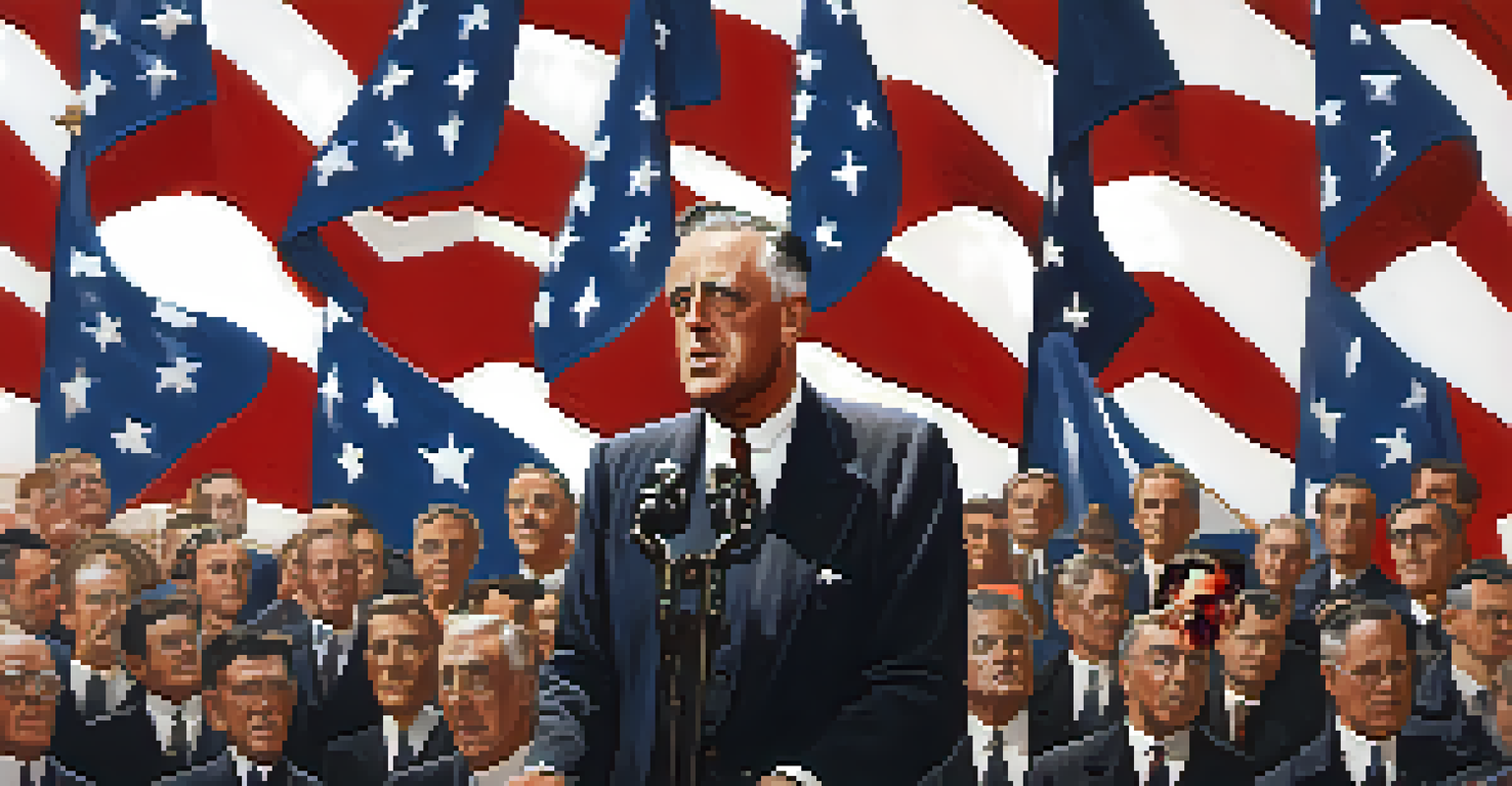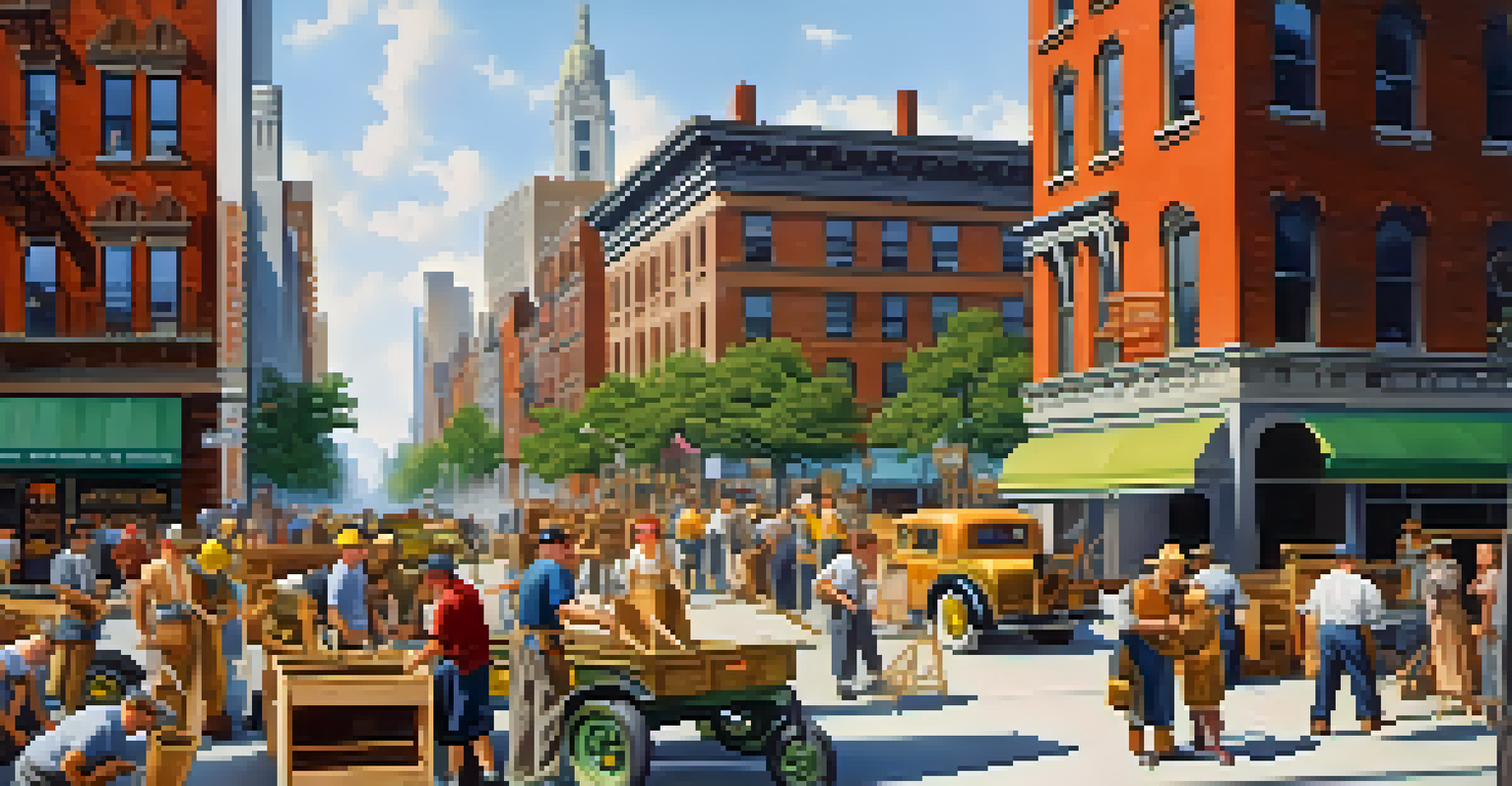The Legacy of Franklin D. Roosevelt in New York City

The Early Years: FDR's Connection to New York City
Franklin D. Roosevelt's roots run deep in New York City, where he was born in 1882. Growing up in a wealthy family in Hyde Park, he often visited the city, shaping his understanding of its complexities. This early exposure to urban life would later inform his political career and social policies.
The only thing we have to fear is fear itself.
His involvement in New York politics began when he served as a state senator in 1911. Here, he championed progressive reforms, demonstrating his commitment to social justice. These formative experiences laid the groundwork for his future as a national leader.
Roosevelt's ties to New York not only influenced his political perspectives but also helped him build a network of allies that would support his presidential ambitions. His connection to the city was both personal and political, setting the stage for his legacy.
The New Deal: Transforming NYC's Landscape
FDR's New Deal initiatives in the 1930s brought significant changes to New York City, aiming to combat the Great Depression. Programs like the Works Progress Administration (WPA) created jobs for thousands, revitalizing the urban economy. This initiative not only provided relief but also left a lasting mark on the city’s infrastructure.

Through the New Deal, FDR also focused on public works, leading to the construction of iconic structures like the Triborough Bridge and the Lincoln Tunnel. These projects enhanced connectivity and accessibility across the city, shaping its physical and economic landscape.
FDR's NYC Roots Shaped His Leadership
Franklin D. Roosevelt's early experiences in New York City influenced his political beliefs and helped him build a network that supported his presidential ambitions.
The New Deal's impact extended beyond mere construction; it fostered a sense of hope and resilience among New Yorkers. By directly addressing their struggles, Roosevelt solidified his reputation as a leader who cared deeply about the welfare of the people.
Social Reforms: FDR's Commitment to Equality
FDR's legacy in New York City also includes his unwavering commitment to social reforms. His administration championed policies that aimed to improve labor rights, housing, and education, particularly for marginalized communities. This focus on equity resonated deeply with the diverse population of NYC.
In our progress towards a world of peace, we must not forget that the greatest threat to peace is the absence of justice.
One notable achievement was the establishment of the Social Security Act in 1935, which provided financial support to the elderly and unemployed. This program laid the groundwork for modern social safety nets, fundamentally changing how society supports its vulnerable members.
FDR's advocacy for civil rights, though limited by the era's constraints, began to shift attitudes in New York. His administration's efforts to promote inclusivity paved the way for future movements that would continue to push for social justice.
Crisis Leadership: FDR During World War II
As World War II loomed, FDR's leadership became crucial for both the nation and New York City. In 1941, he famously declared that the U.S. would be the 'arsenal of democracy,' emphasizing the city’s role in wartime production. NYC became a hub for military manufacturing, providing jobs and boosting the economy.
During this period, Roosevelt also prioritized the mobilization of resources and personnel. The establishment of the Brooklyn Navy Yard exemplified how the city adapted to meet wartime needs, showcasing its resilience and capacity for innovation.
New Deal Revitalized NYC's Economy
Roosevelt's New Deal initiatives transformed New York City by creating jobs and constructing vital infrastructure, fostering hope during the Great Depression.
FDR's ability to unite the nation during such a tumultuous time left an indelible mark on New Yorkers. His inspiring speeches and unwavering resolve fostered a sense of collective purpose that resonated deeply within the city.
Cultural Contributions: FDR and the Arts in NYC
Roosevelt recognized the importance of the arts in fostering national pride and unity. His administration supported various cultural initiatives, including the Federal Art Project, which aimed to employ artists and showcase their work. This initiative not only enriched NYC's cultural landscape but also made art accessible to the masses.
The WPA also funded theater productions, music, and literary projects that celebrated American culture. Notable figures, such as playwrights and musicians, emerged during this time, contributing to a vibrant cultural scene in New York City.
FDR's legacy in the arts is evident in the numerous institutions and public artworks that thrive today. His belief in the transformative power of culture remains a cornerstone of the city’s identity.
Legacy: Monuments and Remembrances of FDR in NYC
New York City honors FDR's legacy through various monuments and institutions dedicated to his memory. The Franklin D. Roosevelt Four Freedoms Park on Roosevelt Island is a poignant tribute, celebrating his vision of freedom and human rights. This serene space invites reflection on his contributions and ideals.
Additionally, the FDR Presidential Library and Museum in Hyde Park serves as a resource for understanding his presidency and policies. It houses a wealth of documents and artifacts that illustrate his impact on both the nation and the city.
FDR's Legacy Inspires Modern NYC
Roosevelt's commitment to social justice and community resilience continues to influence current initiatives aimed at improving the lives of New Yorkers.
These memorials ensure that Roosevelt's ideals continue to inspire future generations. They remind New Yorkers of the importance of leadership, compassion, and resilience in facing challenges.
FDR's Enduring Influence on Modern NYC
Franklin D. Roosevelt's influence is still felt in New York City today, particularly in its social and political landscape. His commitment to public service and social justice resonates with current leaders and activists. Many initiatives aimed at improving the lives of New Yorkers can trace their roots back to his policies.
Moreover, FDR's emphasis on community resilience continues to inspire city responses to contemporary challenges, such as economic downturns and public health crises. His belief in the power of government to effect positive change remains relevant.

As New Yorkers navigate the complexities of modern life, Roosevelt's legacy serves as a guiding light. His vision for a more equitable society encourages ongoing efforts to uplift and empower all residents of the city.